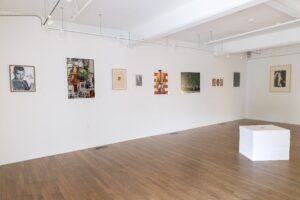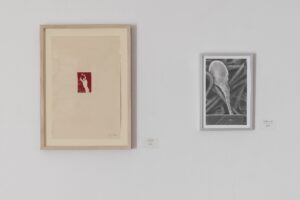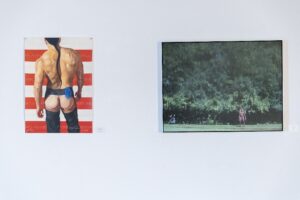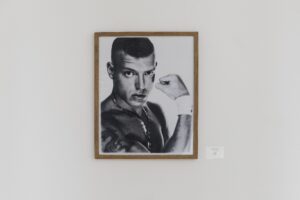The mood in the packed room was sober, but not without humor. The crowd at Stanley — the new Twenty Summers space in the East End — was there to consider responses to the rise of American fascism. They were surrounded by an exhibition titled “American Faggot Party,” curated by Quil Lemons as a declaration of liberation.

The Aug. 9 event, called “Navigating Queer Leadership and Resilience,” was a discussion organized by the Boston Art Review in collaboration with Lemons. Four panelists, all arts professionals from different disciplines, talked about challenges queer artists face in today’s political climate and the strategies and alliances that can help creative people endure.
Art adviser and patron Gavin Kennedy, who moderated the conversation, asked the panelists how the current administration has affected their work and what is at stake.
“So, light work,” said Giselle Byrd, prompting laughter from the audience.
Byrd is director of the Theater Offensive, a Boston company presenting work by queer and trans artists of color. Her remarks were unflinching. “This is now a time to create the art of war,” she said. “This is war on our bodies, on our culture. We have to be prepared to meet that moment.” She pointed to the denial of gender-affirming health care and the official erasure of trans identities as conditions that weigh heavily on individual artists and consequently affect the arts ecosystem as a whole.

Michael Bobbitt, executive director of the Mass. Cultural Council, brought a barrage of statistics. There are 15,063 arts organizations operating in Massachusetts, he said, and 112,000 full-time artists. Factoring in part-time artists and staff at those organizations, he estimated that between 500,000 and 700,000 people work in the arts in the state.
That number, Bobbitt argued, represents untapped political potential. The arts community, he said, is poorly organized when it comes to advocacy and policymaking. As an example, he said, when funding for school programs in STEM (science, technology, engineering, and math) surged in the early 2000s, cementing Massachusetts’s position as a national leader in science and tech, the arts responded with STEAM — adding “arts” to the acronym — but without the follow-through needed to translate values into actual legislation or funding.
Jameson Johnson, founder and editor of Boston Art Review, spoke about the role of arts publishing. “Arts and journalism are always the canaries in the coal mine for authoritarian regimes,” she said. There’s a reason for that: arts and culture create “a place where we can gather, where we learn. Community, education, learning, working together — those are the things authoritarian regimes want to dismantle.”

Johnson said she’s been thinking a lot about the responsibilities of writers and the press “and how we can push back.” The Review is looking to hire an editor focused on cultural policy — work that may be less glamorous than criticism but is vital to documenting local governance and arts-related legislation, she said. “We did this in direct response to the Trump administration.”
Photographer Quil Lemons brought an artist’s perspective to the panel. Lemons was a resident artist at Twenty Summers last year and returned this season to mount the exhibition on view at Stanley. The show features works by Lemons and 12 other artists, all portraits of queer men, some frank, others stylized, all asserting visibility, community, and desire.
His “American Faggot Party,” he said, “is my response to an administration telling me that I’m not valid.” He also means to confront Provincetown itself with the project. While the town is widely known as a queer haven, Lemons said much of the attention he receives here amounts to “fetishization or racism.” The show, he said, counters that as a self-determined statement.
The panelists sounded alarms but also offered hope. Bobbitt described a program the cultural council has launched that allows health-care providers to prescribe “doses of arts and culture”: tickets to museums, theaters, and other cultural institutions that are paid for by insurers and other third parties.

Kennedy asked the panelists how the audience could best support the work they saw as essential. Byrd said people need to embrace a vision of liberation that includes everyone and to call out racism and transphobia wherever they appear.
Johnson returned to the importance of supporting local journalism, which keeps a record of what’s happening in the community.
Bobbitt echoed Kennedy’s suggestion that the arts need “a broader partnership, platform, or collaboration” to advocate for change. Political organization, Bobbitt said, would require study of business, law, and policy, not just passion for the arts.
Twenty Summers, now in its 12th year, is known for its artist residencies and programs at the Hawthorne Barn in May and June. In 2024, the organization opened a new space at the back of the Schoolhouse Gallery to present events year-round. The name “Stanley” honors poet Stanley Kunitz, who was instrumental in Provincetown’s artistic and literary life; the words “Twenty Summers” start the last line of his poem “Route Six.”
While Stanley has hosted book talks and other gatherings, “American Faggot Party,” on view through Sept. 28, has provided a focal point for a series of conversations on art, identity, and politics. Upcoming events include a panel with the exhibition’s artists on Sept. 6 and a meditation session with Philadelphia-based wellness collective Spirits Up on Sept. 27.

The panel didn’t offer any easy answers. Nor did it shy away from difficult questions. The panelists described a landscape of political hostility, economic precarity, and systemic inequity. But they pointed to strategies of resilience: art as declaration, journalism as witness, organizing as leverage, and community as both refuge and catalyst for change. Surrounded by artworks celebrating queer defiance, these ideas felt less like conjecture and more like calls to action.
Art & Politics
The event: “American Faggot Party” exhibition and events
The time: Through Sept. 28
The place: Stanley, 494 Commercial St., Provincetown
The cost: Free; see 20summers.org



